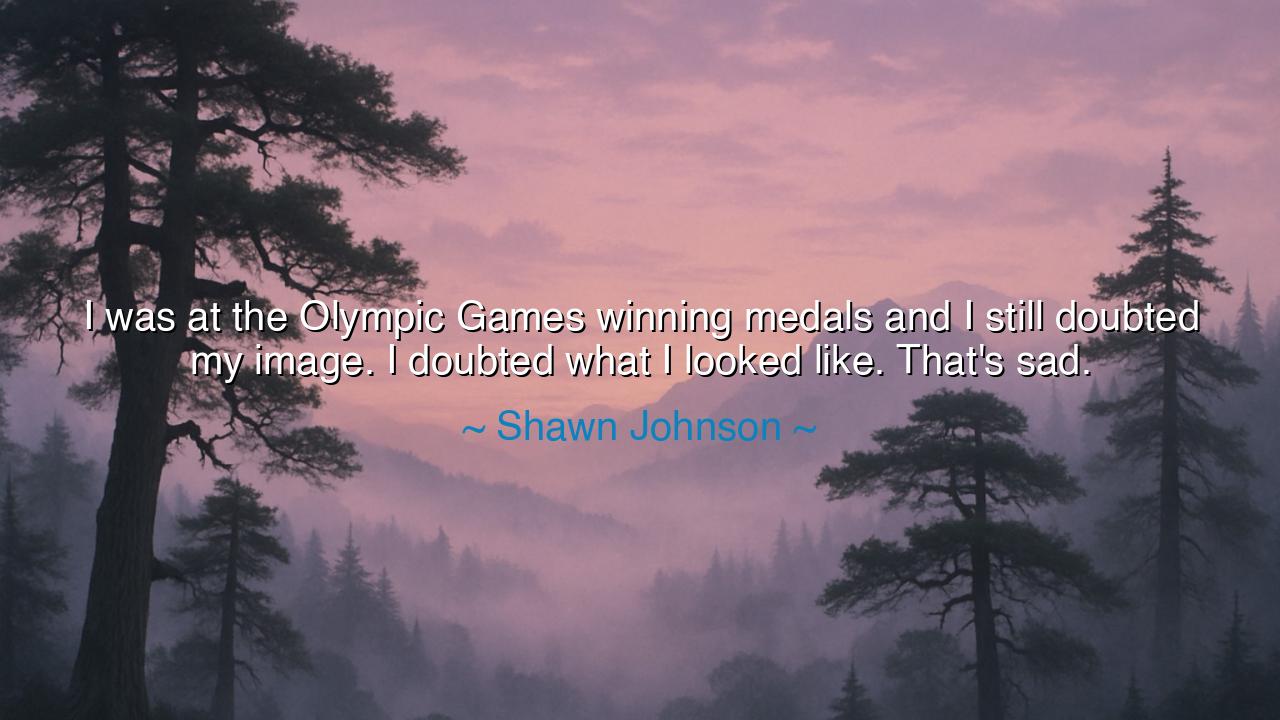
I was at the Olympic Games winning medals and I still doubted my
I was at the Olympic Games winning medals and I still doubted my image. I doubted what I looked like. That's sad.






The words of Shawn Johnson, “I was at the Olympic Games winning medals and I still doubted my image. I doubted what I looked like. That’s sad,” strike like a whisper from the soul of modern humanity—soft yet devastatingly profound. In them lies the sorrow of a generation that has achieved greatness yet remains haunted by the mirror. Johnson, a champion of discipline and beauty in motion, reveals the tragic paradox of her triumph: that even amid glory, she was not free from doubt. Her words remind us that outer success cannot heal inner insecurity, and that the true battle for peace is not fought in the arena, but within the heart.
At the core of her lament is a universal truth—that self-doubt is not conquered by achievement. The medals that glimmered upon her chest, the applause that shook the stadium, the glory that most could only dream of—none of these silenced the quiet voice of judgment within. It is the curse of the age, as it was of ages past: the illusion that perfection of form can grant serenity of soul. Yet even in ancient times, the wisest knew otherwise. The Stoics taught that external victory means little if the spirit remains enslaved to opinion. The philosopher Epictetus once said, “No man is free who is not master of himself.” Shawn Johnson, in her confession, becomes a living echo of that truth.
The tragedy she names is not hers alone, but the tragedy of the human condition—that one may climb the highest mountain and still feel unworthy at its peak. How many kings, poets, and heroes have faced this same shadow? Consider the tale of Alexander the Great, who, after conquering the known world, wept because there were no more worlds to conquer. His despair was not for lack of victory, but for lack of peace. Like Johnson, he stood at the summit of achievement and found it barren. The applause of the world fades quickly when the inner voice remains unsatisfied. For the deepest hunger of the soul is not for fame, but for acceptance—for the quiet joy of saying, “I am enough.”
Johnson’s sorrow also reveals the tyranny of image in a culture that prizes appearance above essence. Even as she represented the pinnacle of athletic excellence, she felt the invisible weight of comparison, expectation, and scrutiny. The ancient Greeks, who worshiped both beauty and discipline, understood this tension. They believed the body should reflect harmony and proportion, but their philosophers warned that beauty without wisdom leads to vanity, and vanity to emptiness. The true ideal, they said, was kalokagathia—the union of physical grace and moral goodness. In this light, Johnson’s pain becomes prophetic, exposing a world that exalts perfection yet forgets meaning.
And yet, from this pain arises a lesson of profound strength. To admit such vulnerability is itself an act of courage. By revealing that even in victory she felt doubt, Johnson has done what few champions dare—she has humanized success. Her words teach us that the measure of greatness is not the absence of fear or insecurity, but the ability to live honestly in spite of them. Just as ancient warriors bore scars with pride, seeing them as signs of endurance, so too must we learn to see our emotional wounds not as shame, but as proof of humanity. The broken heart, once faced, becomes the teacher of compassion.
In her reflection lies a message for all who chase approval: no amount of praise can replace self-acceptance. The mirror of the world will always distort, but the mirror of the soul tells the truth. The first step toward peace is to look inward without judgment—to see the divine spark within that no failure can dim, and no victory can enhance. When one learns to love oneself not for beauty, talent, or fame, but simply for being, then the cycle of doubt is broken. This is not pride; it is liberation—the freedom to live as one’s truest self.
So let this teaching be passed down: seek not perfection of form, but wholeness of spirit. The applause of the world fades, but the stillness of self-acceptance endures. As Shawn Johnson reminds us, the saddest thing is not to fall short of others’ expectations—it is to win and still feel unworthy. Let every soul remember that worth is not earned, but inherent; not given by medals, but revealed by honesty. For in the quiet courage of accepting one’s own reflection, the human heart finally becomes free.






AAdministratorAdministrator
Welcome, honored guests. Please leave a comment, we will respond soon